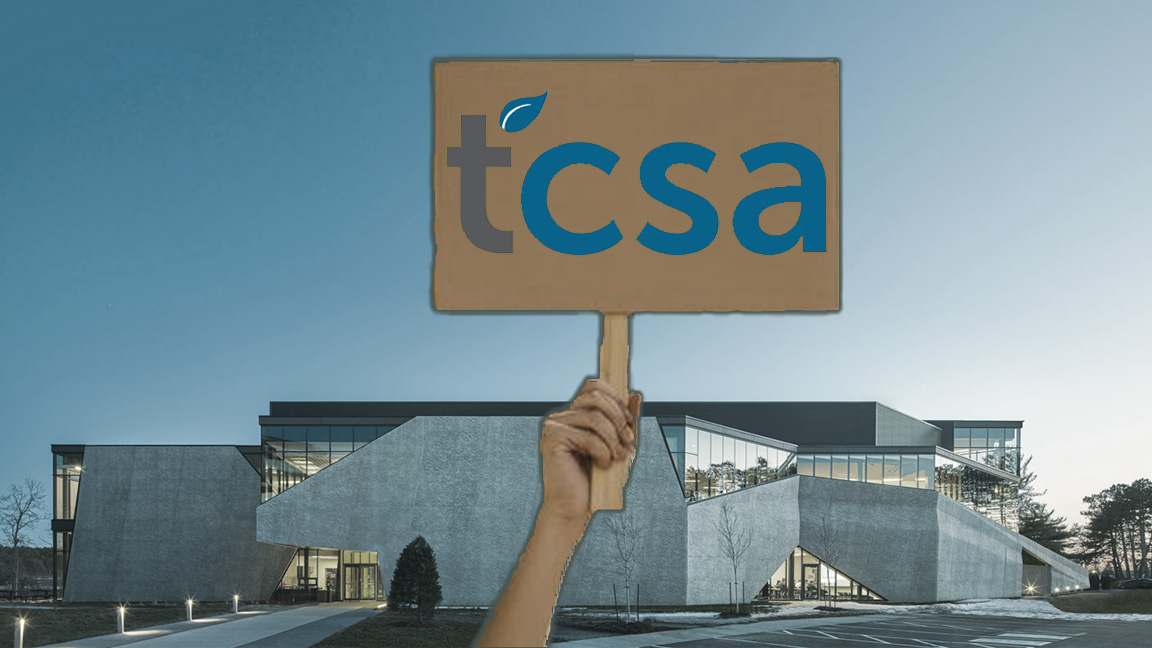The February 12th meeting of the TCSA Board of Directors was called to order over Zoom by Chair, Robert Monico, at 1:03 PM. After the Association’s customary land acknowledgement and a few words of warning about the week’s recent flash-freeze conditions, Monico moved into the approval of minutes.
At this point, President Zoe Litow-Daye interjected with an amendment to the motion to move the approval of a January 26th emergency meeting of the Association’s Board of Directors to the following meeting, as the board had not received the minutes in question as part of the February 12th meeting package. Arthur was unable to report on the emergency board meeting in question as it was not publicly announced nor were members of the public invited to attend.
Following the approval of the prior meeting’s minutes, the agenda turned to Executive reports, with Litow-Daye’s presidential report opening the proceedings.
The report—which covered January 17th to February 12th—included a number of high-profile items, notably including the Association’s drafting of their second draft budget for the year. Litow-Daye also announced she was investigating the possibility of establishing a new line of student funding under the acronym “SPACE”—Student Placement and Curricular Experience bursary. While to many it might seem another instance of the Association working hard for a cutesy name, it’s commendable to see money being put into the hands of students who need it.
Litow-Daye also provided an update on the Honorific and Wayfinding Campus Names Committee’s role in the naming of Trent’s long-promised new college, proposed to open by 2027. One of the recommendations included in the Champlain Committee’s October 14th Report was that the proposed college be named in Anishinaabemowin. To this end, the Elder’s Council is soon to convene and provide a list of possible names, though final judgment remains at the discretion of the naming committee.
The President provided a brief overview of a number of other items; with TCSA elections underway, the Association has begun organizing events for the duration of the campaigning period. Trent is also in the process of selecting a new librarian, though Litow-Daye’s term will likely be exhausted before the interview process meaning, in her words, “[her] predecessor [sic] will be participating in the interviews.” Litow-Daye further provided an update about the Association’s Naloxone training program, which has been fully funded by Trent. The President says the Association hopes to get 120 students Naloxone certified, and encouraged members of the board to register, saying she would “love to see [them] as student leaders.”
While the previous items went forward without much in the way of discussion, the President’s Food Bank update proved a particularly divisive item between some Directors. Following the upcoming reading break, Litow-Daye announced, students will have to register for a predetermined time slot to access the TCSA’s food pantry/bank, “One Stop Chop”. This marks a change from the pantry’s prior open-access model, with students being able to access the resource more or less whenever during the Association’s office hours. The President cited a number of reasons for the change, including students accessing the food bank being a nuisance or otherwise impeding the work of the executive in the office, the pantry being routinely exhausted on its Wednesday restock day, and concerns about the financial and food security of those utilizing the pantry.
“We've noticed what happens, there will be, you know, five to ten students that will show up at once and use the pantry all at once. The office gets very busy, very crowded. Students also kind of start to like panic grab because there's lots of other students around them,” the President explained. “On days when we stopped being so heavily utilized that we're seeing like eighty people access the pantry in one day and then everything is gone. So we're just trying to implement a system where students will book an appointment ahead of time.” After reading week, students will be able to book one appointment once every two weeks up to twelve hours before their preferred appointment time to acquire access to the food bank.
While the President expressed their belief that this represented “a little bit more of a comfortable way” for students to access the food pantry, a number of directors raised concerns about the privacy and comfort of students accessing the service. “I worry if we’ll see a reluctance for students to come and use it just under the idea that they have to book an appointment,” said Champlain College Cabinet President, Campbell Deck. “I mean to some students it may be somewhat embarrassing or unnerving for them to book an appointment that basically acknowledges that they need help with food.”
“I totally hear that,” the President acknowledged. “One thing we have also noticed is students will admittedly come into the office and kind of make statements that they are not food insecure, but they're still accessing the pantry.” While on the Association’s website, the service’s listing notes that the pantry “is free for all students to access,” and strives to offer “an equitable, accessible, and welcoming environment” for those accessing it, the President expressed concern and disapproval about some students’ use of the service. “I'm hoping that [the appointment-based system] will kind of eliminate folks who aren't facing food insecurity and are just, you know, accessing the pantry and saying, ‘Oh, it's really great. We get to hit a lick on the TCSA, open up your bag!’ and they start filling their backpacks with food, because that is genuinely situations that our staff are seeing,” Litow-Daye said.
Part of this is motivated by concerns that students are harassing front desk staff in the TCSA office, with Litow-Daye stating that “[the Association has] had some incidences where our front desk staff have actually been intimidated by students and [that] students have, you know, been aggressive towards them in terms of accessing the pantry later in the evening.” Consequently, the Association is shifting the hours that the pantry will be accessible under the by-appointment model. “The way we're setting it up is it's going to be accessible from nine–five when the office is more staffed,” the President said. While she noted that students will still be able to set up private appointments outside of these hours should they be unable to access the pantry during this time, it still represents a functional cut to the hours during which the food bank is accessible.
VP Health & Wellness, Holly Naraine, clarified that “before [the appointment system] was implemented, other schools—namely Guelph—did have an appointment type of system, not necessarily an appointment, but people did have to register and pick up to have access to the pantry.” The VP added that “[she does] think from [her] experience being in office, it will be beneficial to help lower it down.” She added that “there have been times where like, a whole group of people have come in and I've seen it cause my desk is right there, and it's like—once people figure out that, you know, Wednesdays are restock days, everything's gone.”
President Litow-Daye added that the proposed limit of one appointment per student every two weeks would help reduce the number of students regularly accessing the pantry. “Currently the way we've worked it out is once every two weeks is the rule of thumb just because—and I know you've seen Holly—there are students who come in and access the pantry every single day,” she acknowledged. “They come in and access the pantry every single day and take a bag of food every single day, and we just want to ensure that there's enough food for all students because what's happening, like you said, is by the end of the day, there's nothing left… we want to ensure that all students who need to access the pantry have access, instead of it all kind of going to the same ten-fifteen students who like to come every single day and take a bag of food.”
“Anything that's more than that is automatically canceled through the booking system on the website,” the President explained. “Yeah, I'm just really excited to see how it plays out.”
Otonabee College Cabinet President, Meaghan Kemp, expressed further concerns with the proposition, asking if there would be any method for students to access the service anonymously. To this Litow-Daye replied in the negative, explaining that “currently students already when they're accessing the pantry, have to sign in at the front desk—they do already have to give [their] first name, last name and student number.” The President added that “[the Association is] still seeing upwards of eighty accesses of the pantry per day,” despite the lack of affordances for students’ anonymity. “I understand where you folks are coming from,” said Litow-Daye, “but so far we haven't seen any data that would say that students are being prevented from accessing the pantry because they have to give their Trent e-mail or their student number because we're already seeing, you know, eighty folks do today and they're willing to give that information. [...] of course, if a student wanted to access it completely anonymously,—which students have—all they have to do is send, you know, an e-mail and we set up that appointment for them,” Litow-Daye quickly added.
Still, as OC President Kemp noted in their earlier interjection, most student’s emails contain identifying information insofar as they are tied to students’ first and last names. Further, the email route still requires an appointment, if only through the President directly as opposed to an automated booking system, which does not exactly constitute “complete anonymity”.
With a population of well over 9000 students, the number of students regularly accessing the pantry remains a miniscule fraction of the total population. When one considers that a 2018 study found a whopping 48% of Trent University students to be food insecure, the less-than-one-percent figures with which the TCSA is dealing prove, if anything, an alarmingly small representation of a vast systemic issue. One could argue the exact opposite of Litow-Daye’s case—that if anything, the number of students accessing the pantry is surprisingly low, especially considering the compounded effects of the ongoing pandemic and cost of living crisis represents a seemingly small slice of the number of students one can presume to be food insecure at Trent.
This in turn, reflects the One Stop Chop’s nature as, in the Association’s own words, “Trent’s first centralized on-campus food pantry.” “Centralized,” proves an important designation here, as one could hardly fault students for feeling uncertain about the degrees of interfacing with the TCSA which accessing the food bank necessitates. While the grocery assistance program which preceded it was largely navigated online, the One Stop Chop necessitates students to go to the student centre (which means a considerable commute for most off-campus students), meet with front desk staff, and collect their goods in full view and earshot of TCSA executives and staff. Indeed, the board’s open discussion of student behaviour in regards to a service which is meant to be accessible to all without judgement, might only serve to further dissuade students already put off by having to so conspicuously access a service largely aimed towards a vulnerable population.
Ultimately, despite anecdotes recited by members of the Executive, unless one is personally privy to the personal banking information of a student, they are unable to determine their food security status or make claims as to their validity in accessing the service. While those who champion this change expound upon its virtues, the One Stop Chop will, realistically, never be able to meet the lofty goal of “[ensuring] that there's enough food for all students” when it already runs out of food despite being regularly used by a percentile of the undergraduate population. To its critics, this measure amounts to policing the terms on which Trent undergraduate students access a service offered by their representative body. If fewer students access the pantry from here onward, one could argue, it is only because the TCSA is bureaucratically preventing them from doing so. While the decision to change to a by-appointment model will go forward as it stands, it remains to be seen what the outcomes of this decision will ultimately be.
Following the conclusion of the President’s report, the rest of the VPs concluded their executive reports. General Manager, Tracy Milne then proceeded with a budget overview, though kept it brief as the budget was to be thoroughly reviewed line-by-line at the TCSA’s Semi-Annual General Meeting the next day. Milne specifically highlighted the Association’s obligation for financial transparency, saying better measures were required to make sure the Association’s payments via e-transfer could stand up to scrutiny, as much of their monetary exchange is now being done solely online.
Following the update, the agenda turned to Any Other Business, and after a few brief updates, the President motioned to move into closed session. Upon a majority vote, I was duly sequestered and the Association entered closed session for thirty minutes, before returning for the Association Resource Manager and General Manager updates. Association Resource Manager, Wendy Walker, mostly echoed the President’s election update, and General Manager, Tracy Milne said she had little else to add, thus the topic turned to adjournment.
At just shy of two hours, the Chair received the motion to adjourn, and the TCSA Board Meeting for February 12th, to reconvene at 4:30 PM for the SAGM the next day.


.png)


.jpg)


.jpeg)



.jpg)


.jpg)









.png)